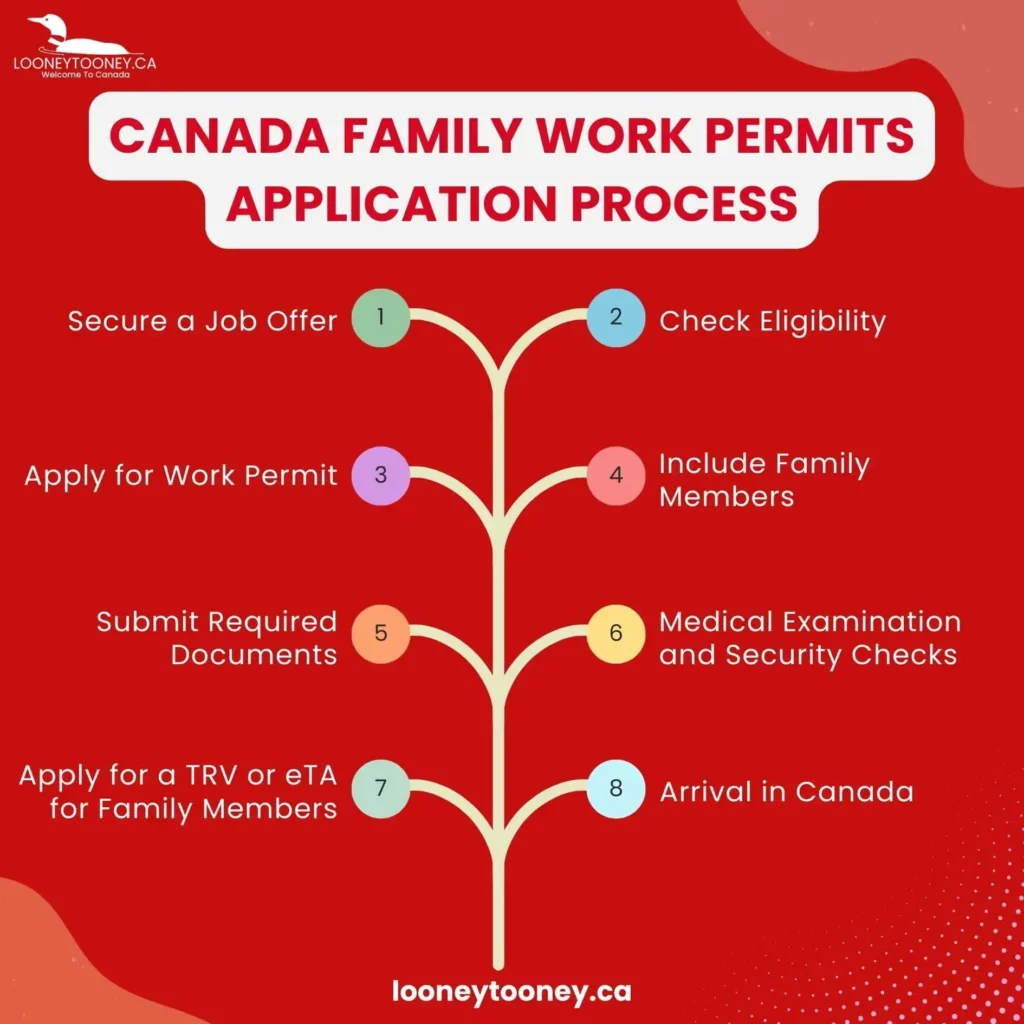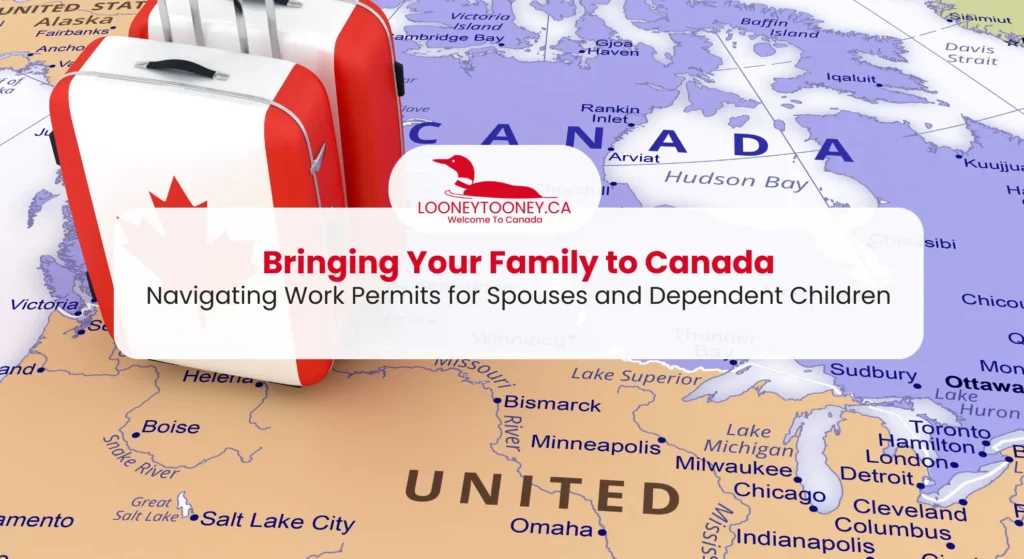Canada is a country known for its welcoming atmosphere and diverse culture, making it a desirable destination for individuals seeking opportunities for both personal and professional growth. For many individuals who obtain work permits in Canada, the prospect of reuniting with their families is a significant factor in their decision-making process.
The Canadian government recognizes the importance of family unity and offers provisions for spouses and dependent children to accompany their loved ones through various immigration pathways, including obtaining work permits. In this article, we will explore the key aspects of Canada Family Work Permits for spouses and dependent children.
Table of Contents
- Understanding Work Permits for Spouses and Dependent Children
- Who is Eligible for Canada Family Work Permits?
- Canada Family Work Permits Application Process
- Duration and Renewal
- Benefits of Reuniting with Family
- Challenges and Considerations
Understanding Work Permits for Spouses and Dependent Children
When a foreign national is granted a work permit in Canada, they may also have the opportunity to bring their immediate family members, including their spouse or common-law partner, and dependent children, to join them. This allows families to stay together and experience the benefits of living and working in Canada together.
Canada’s immigration policies are designed to promote family reunification and offer opportunities for families to stay together while pursuing personal and professional goals in the country. Work permits for spouses and dependent children are an integral part of these policies, allowing family members to join their loved ones who have obtained work permits in Canada. In this section, we will delve into the details of understanding work permits for spouses and dependent children, including eligibility criteria, application processes, and key considerations.
Who is Eligible for Canada Family Work Permits?
Bringing your family to Canada through work permits for spouses and dependent children is a valuable opportunity to maintain family unity while pursuing professional opportunities in the country. To ensure a smooth process, it’s crucial to understand the eligibility criteria that need to be met for family members to accompany the primary applicant on their journey. In this section, we will delve into the detailed eligibility criteria for obtaining work permits for spouses and dependent children in Canada.
1. Primary Applicant’s Job Offer
The primary applicant, often the individual who has received a job offer from a Canadian employer, forms the foundation of the family reunification process. The job offer should meet certain criteria:
- The job offer must be genuine and come from a legitimate Canadian employer.
- The position should align with the National Occupational Classification (NOC) system, which categorizes jobs based on skill level and type of work.
- The NOC code of the job offer should fall under an eligible occupation category.
2. Job Classification
The job classification of the offered position is significant, as it determines whether the primary applicant’s work is eligible for family sponsorship:
- Many skilled and semi-skilled occupations are eligible for family sponsorship through work permits.
- The job’s skill level, wage, and other factors play a role in determining eligibility.
3. Work Permit Duration
The duration of the primary applicant’s work permit plays a pivotal role in family sponsorship:
- The work permit’s duration should meet or exceed the minimum requirement for family members to be eligible to apply.
- If the primary applicant’s work permit is very short-term, it might not be possible for family members to accompany them.
4. Temporary Resident Visa (TRV) or Electronic Travel Authorization (eTA)
Depending on the nationality of family members, they might need to apply for a Temporary Resident Visa (TRV) or an Electronic Travel Authorization (eTA) to enter Canada:
- These documents ensure that individuals from certain countries meet the admissibility requirements before entering Canada.
5. Relationship Proof
Proving the relationships between the primary applicant and their family members is crucial:
- Spouse or Common-Law Partner: Marriage certificates or proof of a common-law relationship are required.
- Dependent Children: Birth certificates or documents proving parent-child relationships are necessary.
6. Medical Examination and Security Checks
Family members might need to undergo medical examinations and security checks:
- These checks ensure that individuals are admissible to Canada from a health and security perspective.
- Meeting these eligibility criteria is essential for a successful application for work permits for spouses and dependent children. Understanding and fulfilling these requirements can pave the way for a smooth process of reuniting with your family in Canada.
Canada Family Work Permits Application Process
Bringing your family to Canada through work permits for spouses and dependent children involves a series of steps to ensure a smooth and successful process. Navigating the application process correctly is essential to reunite with your loved ones while pursuing professional opportunities. In this section, we will provide a detailed overview of the application process for obtaining work permits for spouses and dependent children in Canada.
1. Secure a Job Offer
The first step in the process is for the primary applicant to secure a valid job offer from a Canadian employer. This job offer should align with the eligibility criteria for family sponsorship through work permits, including the job classification and duration.
2. Check Eligibility
Before proceeding with the application, ensure that the primary applicant’s job offer meets the criteria set by the Canadian government for family reunification. The job offer should be genuine, the position should fall under an eligible NOC code, and the skill level and wage should align with the requirements.
3. Apply for Work Permit
Once the job offer is secured, the primary applicant can apply for a work permit. This application can be completed online through the Immigration, Refugees and Citizenship Canada (IRCC) website or through a paper application, depending on the applicant’s country of residence. The application should include all required documentation and information.
4. Include Family Members
During the work permit application process, the primary applicant can include their spouse or common-law partner and dependent children by providing the necessary documentation to prove their relationship. This documentation may include marriage certificates, birth certificates, and other relevant proof.

5. Submit Required Documents
Family members need to submit the required documents to prove their identity, relationship with the primary applicant, and their admissibility to Canada. The list of required documents may include passports, marriage certificates, birth certificates, photographs, and any additional documents as specified by IRCC.
6. Medical Examination and Security Checks
Depending on the nationality and circumstances of the family members, they might need to undergo medical examinations and security checks. These checks ensure that individuals meet the health and security requirements for entry into Canada.
7. Temporary Resident Visa (TRV) or Electronic Travel Authorization (eTA)
Family members from certain countries may need to apply for a Temporary Resident Visa (TRV) or an Electronic Travel Authorization (eTA) to enter Canada. This step ensures that they meet the admissibility requirements before coming to Canada.
8. Arrival in Canada
Once the work permit is approved, the primary applicant and their family members can travel to Canada. They should have their work permits and any required entry documents ready to present upon arrival. The Canada Border Services Agency (CBSA) officers will review the documents and make an entry decision.
The application process for obtaining work permits for spouses and dependent children in Canada involves several critical steps, from securing a job offer to arriving in the country. It’s important to carefully follow the application instructions, provide accurate and complete information, and submit all required documentation to ensure a smooth and successful process.
Duration and Renewal
When it comes to Canada Family Work Permits, understanding the duration of the permits and the process of renewal is vital for ensuring a smooth and uninterrupted family experience. In this section, we will delve into the details of the duration of work permits for spouses and dependent children, as well as the steps involved in renewing these permits to maintain family unity.
Duration of Work Permits
Canada Family Work Permits are generally linked to the validity of the primary applicant’s work permit. Here’s what you need to know:
Matching Duration: The work permits for accompanying family members will typically have the same duration as the primary applicant’s work permit. If the primary applicant’s work permit is granted for a certain period, the family members’ permits will also be valid for that specific duration.
Expiration Date: The expiration date of the family members’ work permits is clearly indicated on the permits themselves. It’s essential to keep track of this date and plan accordingly to ensure that the renewal process is initiated on time.
Renewal Process
Renewing work permits for spouses and dependent children is crucial to maintaining their legal status in Canada and continuing family unity. Here’s how the renewal process works:
Primary Applicant’s Work Permit Renewal: If the primary applicant’s job is ongoing and they intend to extend their work permit, they must submit a renewal application before their current work permit expires. This application may require updated documentation, such as a new job offer letter, an updated employment contract, or other relevant materials.
Accompanying Family Members’ Renewal: The renewal process for family members’ work permits typically coincides with the primary applicant’s renewal. To avoid gaps in status, it’s advisable to submit the renewal applications for family members simultaneously with or shortly after the primary applicant’s application.
Updated Documentation: Renewal applications should include updated documentation that supports the primary applicant’s continued employment and the family members’ ongoing eligibility. This could involve submitting documents such as updated employment contracts and proof of relationship.
Processing Time: The processing time for renewal applications can vary, so it’s wise to start the renewal process well in advance of the expiration date. This allows for any potential delays in processing.
Maintaining Status
During the renewal process, it’s crucial for family members to maintain their legal status in Canada. This means refraining from working or residing in Canada after their work permits have expired unless they have submitted their renewal applications and are awaiting a decision. Continuing to stay or work without valid status can have negative consequences for future immigration endeavors.
Understanding the duration of work permits for spouses and dependent children, as well as the renewal process, is fundamental for a successful family reunification experience in Canada. By keeping track of expiration dates, initiating the renewal process in a timely manner, and providing the necessary updated documentation, you can ensure uninterrupted family unity and a seamless journey throughout your time in Canada.
Benefits of Reuniting with Family
Canada Family Work Permits offers a plethora of advantages that contribute to a fulfilling and enriching experience for everyone involved. The Canadian government’s commitment to family reunification creates a supportive environment for families to thrive while pursuing personal and professional growth. In this section, we will explore in detail the benefits of reuniting with your family through work permits in Canada.
1. Family Unity
The most significant benefit of reuniting with your family in Canada through work permits is the opportunity to maintain family unity. Being together in a new country fosters emotional well-being, provides a strong support system, and creates lasting memories that enhance the quality of life for all family members.
2. Access to Services
Bringing your family to Canada grants them access to the country’s comprehensive healthcare, education, and social services. Canada’s healthcare system is renowned for its quality and accessibility, ensuring that your family’s health and well-being are well taken care of. Additionally, your children can benefit from a world-class education system that emphasizes holistic development and fosters critical thinking.
3. Enhanced Quality of Life
Canada boasts a high standard of living, safety, and a diverse cultural milieu that enriches the lives of individuals and families. The country’s natural beauty, from its majestic landscapes to vibrant cities, offers numerous recreational and cultural opportunities that contribute to a well-rounded and fulfilling lifestyle.
4. Career Opportunities
For spouses who wish to pursue employment, Canada’s policies allow dependent spouses of primary work permit holders to apply for open work permits. This means they can explore job opportunities across various sectors, contributing not only to their personal development but also to the family’s financial stability.
5. Education for Children
Dependent children have access to Canada’s excellent education system, which focuses on nurturing critical thinking, creativity, and a global perspective. They can attend Canadian schools and universities, benefiting from diverse learning environments that prepare them for a successful future.
6. Cultural Enrichment
Living in Canada provides families with the chance to immerse themselves in a multicultural society that celebrates diversity. Experiencing different cultures, languages, and traditions enhances family members’ global awareness and tolerance, fostering a broader worldview.
7. Community Support
Canada’s welcoming atmosphere extends to its communities, where families can connect with other newcomers, share experiences, and build a network of support. Local community organizations, social groups, and cultural events offer opportunities for integration and social interaction.
8. Personal and Professional Growth
For the primary work permit holder, reuniting with family can enhance their motivation and job satisfaction. Having loved ones nearby can provide emotional support, reduce stress, and contribute positively to their overall well-being, leading to increased productivity and personal growth.
Canada Family Work Permits is a decision that brings a multitude of benefits. From fostering family unity and providing access to quality services to offering career opportunities and cultural enrichment, Canada’s family reunification policies create an environment where families can thrive together.
Challenges and Considerations
While the prospect of Canada Family Work Permits is appealing, there are challenges and considerations to keep in mind:
1. Documentation and Eligibility
Gathering the necessary documentation to prove relationships and meet eligibility criteria can be complex and time-consuming. Ensuring that all required documents are accurate and submitted correctly is crucial for a successful application process.
2. Financial Aspects
Moving to a new country involves financial planning. You’ll need to consider the cost of living, housing, healthcare, education, and other expenses for both the primary applicant and the accompanying family members. Adequate financial preparation is essential to provide a comfortable life for your family in Canada.
3. Language Proficiency
Depending on the province you settle in and the requirements of the job, language proficiency might be essential for the primary applicant and, in some cases, for spouses seeking employment. Language barriers can affect job opportunities and social integration, making language skills an important consideration.
4. Employment Opportunities for Spouses
While dependent spouses can apply for open work permits, finding suitable employment might pose challenges. Job availability, competition, and recognition of foreign qualifications can impact the spouse’s ability to secure employment.
5. Cultural Adjustment
Adapting to a new culture, climate, and way of life can be challenging for the entire family. Cultural adjustment might involve changes in lifestyle, social norms, and daily routines, which can lead to a period of adjustment and potential stress.
6. Education Transition for Children
Children might face challenges adapting to a new education system, curriculum, and social environment. It’s important to provide them with the necessary support to ensure a smooth transition and successful academic experience.
7. Healthcare and Well-being
Accessing healthcare in a new country might differ from what your family is accustomed to. Understanding the healthcare system, insurance coverage, and available medical services is crucial to ensure your family’s well-being.
8. Long-Term Plans
While work permits provide a temporary stay in Canada, it’s essential to consider your family’s long-term plans. This might include exploring pathways to permanent residency or citizenship, which can involve complex processes and requirements.
9. Family Separation
While the goal is family reunification, the application process and potential processing times might cause temporary family separation. It’s important to emotionally prepare for this possibility.
Canada Family Work Permits for spouses and dependent children is a valuable opportunity to experience personal and professional growth while keeping your loved ones close. The Canadian government’s commitment to family reunification allows families to create lasting memories in a welcoming and diverse environment. By understanding the eligibility criteria, application process, benefits, challenges, and considerations, you can make informed decisions that contribute to a successful and fulfilling family experience in Canada.





